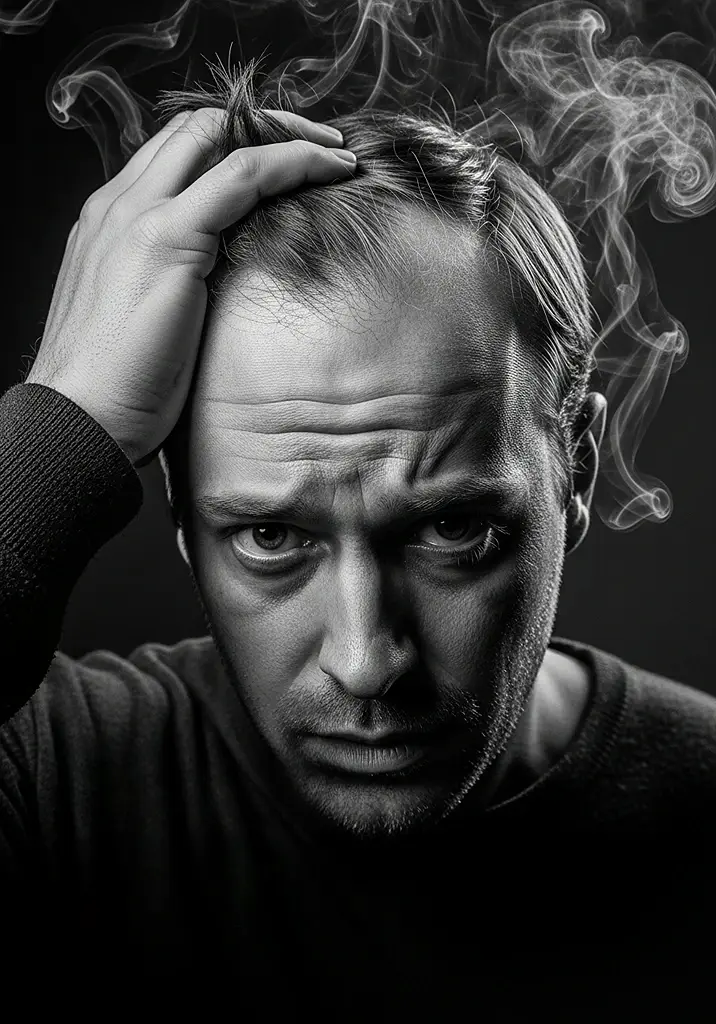At International Hair Clinic, we know that hair loss is not just a cosmetic concern—it can affect confidence, self-esteem, and overall quality of life. While genetics are the leading cause of male pattern baldness, lifestyle choices also play a major role. One habit that has been increasingly linked to hair loss is smoking. Recent research highlights how smoking may not only trigger hair loss but also accelerate its progression. Understanding this connection is key to prevention, treatment, and long-term hair health.
The connection between smoking and male pattern hair loss (AGA)
A 2024 meta-analysis brought new clarity to the link between smoking and hair loss in men. The findings were striking:
- Ever-smokers (men who have smoked at any point in their lives) were 1.8 times more likely to develop androgenetic alopecia (AGA) compared to those who never smoked.
- Men who smoked 10 or more cigarettes per day had twice the risk of developing AGA compared to lighter smokers.
- Smoking was linked to more severe hair loss—smokers had 1.3 times higher odds of progressing from mild baldness (Norwood-Hamilton stages I–III) to more advanced stages (IV–VII).
These numbers highlight smoking as a significant and preventable risk factor for male hair loss.
Study limitations & Expert perspective
While the evidence is compelling, the study had some limitations. It was observational, meaning it showed an association rather than proving direct causation. It also lacked detailed data on nicotine levels, smoking duration, and whether quitting reversed some of the hair loss risk.
Still, dermatologists and hair restoration experts note several mechanisms that could explain the link:
- Oxidative stress: Smoking increases free radical damage, which can weaken hair follicles.
- Reduced blood flow: Nicotine constricts blood vessels, limiting nutrient supply to hair roots.
- Hormonal changes: Smoking may affect hormone levels linked to hair growth cycles.
- Premature graying: The same damage that accelerates hair loss also impacts pigment production.
For these reasons, clinicians are encouraged to ask about smoking habits when evaluating patients with hair loss or premature graying.
Smoking and hair transplant outcomes
The effects of smoking aren’t limited to natural hair growth—they also influence the success of hair restoration procedures. Studies show that smokers often have:
- Lower hair density and growth after transplantation.
- Slower healing and prolonged recovery times.
- Higher complication rates, including excessive bleeding, crusting, and infection.
For patients considering a hair transplant, quitting smoking is one of the most impactful steps to ensure optimal results.
Clinical implications for International Hair Clinic
At International Hair Clinic, we take a holistic approach to hair restoration. That means looking beyond genetics to address lifestyle habits that could hinder progress. For patients who smoke, we recommend:
- Discussing smoking habits openly during the consultation.
- Factoring smoking status into treatment timelines and expectations.
- Encouraging smoking cessation well before any surgical procedure.
By addressing the root cause—not just the symptoms—we help our patients achieve stronger, longer-lasting results.
Practical smoking cessation advice for patients
Quitting smoking is challenging, but it’s also one of the best things you can do for your hair and overall health. Here are some steps to make the process easier:
- Set a quit date and commit to it.
- Seek support from friends, family, or online communities.
- Consider nicotine replacement therapies like patches or gum.
- Stay active—exercise can reduce cravings and improve circulation.
- Focus on the benefits: better hair health, more energy, and improved skin appearance.
Conclusion
The link between smoking and hair loss is stronger than ever. Not only does smoking increase the risk of developing male pattern baldness, but it can also accelerate progression and reduce the effectiveness of hair restoration treatments. By quitting smoking and seeking professional hair care, men can protect their hair, improve transplant outcomes, and enhance overall health.
At International Hair Clinic, we’re here to guide you every step of the way—from prevention and lifestyle advice to advanced restoration procedures.

